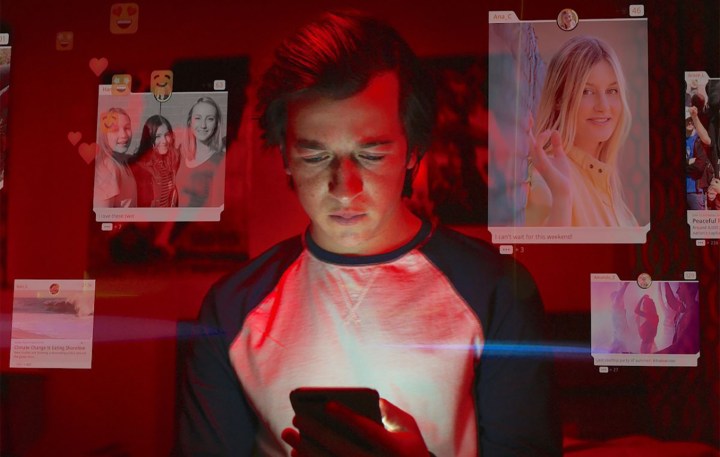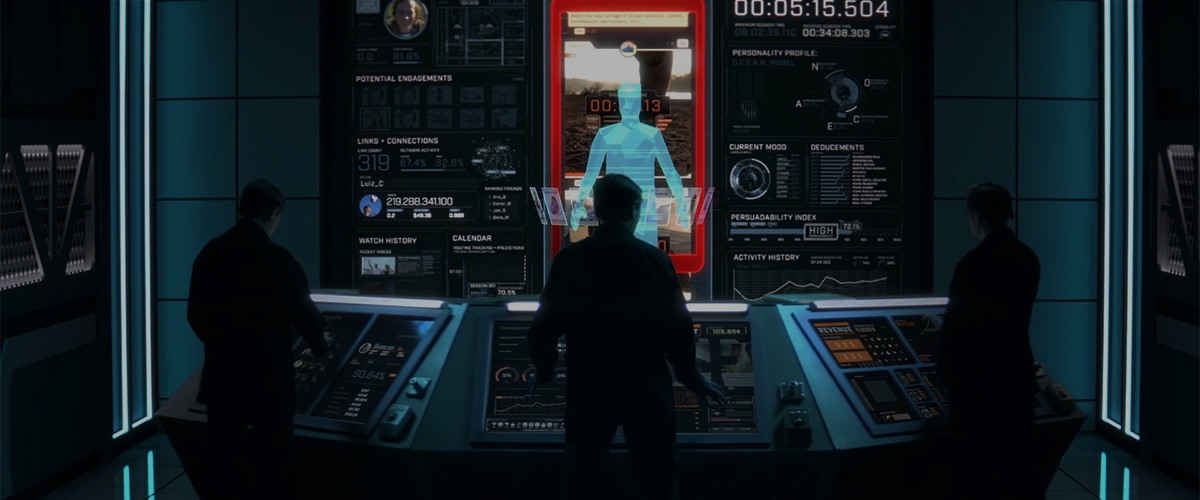SMALL SCREEN
This weekend we’re watching: Surveillance capitalism

‘The Social Dilemma’ is a guided tour through the psychological workings of social media, led by the very people who blazed the trail not knowing what they’d find at the end of it.
It’s important that anyone who uses social media understands how their usage is funded and monetised. There is no doubt that it’s a powerful tool, but remember – you’re the product.
The Social Dilemma
If you were to explain the health risks of cigarettes to a rebellious teen who’s just started smoking, you may well get one of the following replies: minimisation (“I’m only a social smoker”); nihilism (“so what, everything gives you cancer”); short-sightedness (“I don’t want to live to be old anyway”); or simply “piss off”.
The rationale people tell themselves about privacy on social media are pretty similar: minimisation (“I’m only on Facebook to keep contact with family, I barely ever post”); nihilism (“Zuckerberg is omniscient anyway so why not? There’s no fighting a tech-god”); shortsightedness (“I don’t mind if Facebook knows my sleeping patterns or preferred deodorant, what’s the worst that could happen?”); or, once again, simply “piss off”.
You might have seen the trailer for the new Netflix documentary The Social Dilemma, and thought little of it. Everyone knows social media is bad – moving swiftly on. One catch of modernity is the burdening awareness that so much of your convenient lifestyle is detrimental. Your cellphone’s radiation might be lowering your sperm count, your cigarettes are cooking your insides, your hamburger is burning holes in the ozone, your avocado toast is exacerbating deforestation in South America, your shoes might be made by child labourers etc. etc.

‘The Social Dilemma’ directed by Jeff Orlowski (Image supplied)
We are inundated with evidence of the ways in which we are problematic, and it’s overwhelming. Everyone has a different threshold at which they accept that they are flawed and permit themselves harmful behaviour, and the laborious process of becoming a better person involves stretching that threshold. The life of an ethical aspirant is an uphill battle against willful ignorance and cognitive dissonance – forcing oneself over and over to wake up from the matrix, knowing full well that reality is far less attractive.
Few real-world crises fit the matrix analogy better than the cataclysm of social media. If you think you’re the kind of person who would choose the red pill and wake up, watch The Social Dilemma. If you don’t think you’re that kind of person, watch it anyway, and by the end, that may have changed.
The Social Dilemma is a guided tour through the psychological workings of social media, led by the very people who blazed the trail not knowing what they’d find at the end of it. These pioneers, these concerned technological geniuses, know exactly whom it is they’re messing with, and appear visibly terrified in front of the cameras.
The leader of the pack is Tristan Harris, former design ethicist at Google and cofounder of The Center for Humane Technology. Big tech abuse thrives on ignorance and confusion, so Harris’s drive to inform and ability to succinctly explain complex concepts, has won him the title of “the conscience of Silicon Valley”.
Social media is an incredibly powerful tool. But it’s not a tool for you. It may feel like it is because it’s free and you enjoy it, but the reason you don’t have to pay for it is that advertisers are paying for it. Advertisers are the customers; our role in the transaction is closer to livestock who are pacified by grazing on free grass to fatten us up. Harris puts it like this: “If you’re not paying for the product, then you are the product.”
How do you convince a cow not to eat the delicious food that the farmer provides daily? It’s in social media’s interest to keep you happy – they trade in your attention. Indeed, computer scientist Jaron Lanier believes it’s not as simple nor as benign as merely your attention, it’s the gradual change in your behaviour that is the product.
It’s important that anyone who uses social media understands how their usage is funded and monetised. Harris points out that: “A lot of people have the misconception that it’s our data being sold. It’s not in Facebook’s business interest to give up the data.”
Facebook mines your data, which algorithms use to predict how you will behave. Money is made by slowly manipulating that behaviour to persuade you to engage with particular content. Your behaviour is the true currency of surveillance capitalism. Every time you swipe down and refresh the page on social media, you get new content. You don’t know when you’re going to find something you like, so you keep going. Positive Intermittent Reinforcement – that’s what this addictive behaviour is, and it’s the same reflex that makes slot machines so successful in Las Vegas.
“There’s an entire field called growth hacking – teams of engineers whose job is to hack users’ psychology so they can get more growth, more user sign-ups, more engagement. We are pointing AI algorithms back at ourselves to reverse engineer what elicits responses from us.” The Social Dilemma satirically depicts these algorithms as sleazy operators in a control room who will do anything to milk a little more out of you.
An algorithm is programmed to fulfill a particular task. People sometimes believe that this task is to show them what they will be interested in, but in truth, it is more subtle and sinister: the goal is usually to figure out which engagement rabbit hole is closest to your interests and direct you towards that. These monetised rabbit holes are the priority, not the integrity of their content. What that means is that if you have been led to believe just one false belief or just one radical opinion, that is something for algorithms to build on.
Fake news spreads fast, making it popular among social media suggestion algorithms. Indeed, it is becoming clear that fake news on social media typically spreads faster than real news. A study mentioned in the film estimated that fake news on twitter spreads six times faster than real news.
When the facts are not important to you, you can manufacture whatever content will create the most engagement. Fake news often posits itself as something which some manipulative power is trying to keep under wraps, stimulating our natural curiosity. Fake news can give its prey a huge dopamine hit by confirming their pre-existing beliefs and by providing a scapegoat for a person’s anxieties – that is why people are more likely to consume it during times of stress. 2020 has seen throngs of people roped into ludicrous conspiracy rabbit holes, possibly because of the upheaval which Covid-19 has wrought upon us.
Social media has ushered us into the era of alternative truths by providing individuals with curated personalised realities, and there’s currently no fiscal reason encouraging that to change. During his time at Google, Harris essentially staged a failed ethical revolution. It failed because even though it received huge support from employees, there was no legal or financial pressure on the CEO to change the company’s behaviour. This is why we need regulation.
Critics of The Social Dilemma might describe it as fear-mongering or sensationalist with its quick-cut dystopian sequences and tense string-section soundtrack. It’s a dramatised slow-burn suspense-thriller which fits unnervingly well into the conspiracy exposé format. This could have been intentional, so as to peak the interest of a wider audience, and ironically, it makes it impossible to forget that this film too is a product of capitalism, driven by profit and competing for your attention.
In 2014, an American Youtuber called Prince EA published a spoken word video called Can we Auto-Correct Humanity on the vanity of social media, urging people to delete it. The video went viral on Facebook, racking up millions of views and likes, and launching Prince EA into fame. In the description of the video he prompts: “SAY HI TO ME ON SOCIAL” and links his Facebook, Twitter and Instagram accounts.
Surveillance capitalism being as lucrative as it is, it’s difficult not to fall into this trap. The Social Dilemma is aware that it has fallen in to some extent, and in a way, that just further demonstrates how consuming the problem is. Don’t fall into the trap with them and everyone else. Take the red pill, wake up, unplug if you can; understand how the social media machine works and what part of the machine you are. DM/ML
The Social Dilemma is available on Netflix. You can contact This Weekend We’re Watching via [email protected]

















 Become an Insider
Become an Insider
Comments - Please login in order to comment.